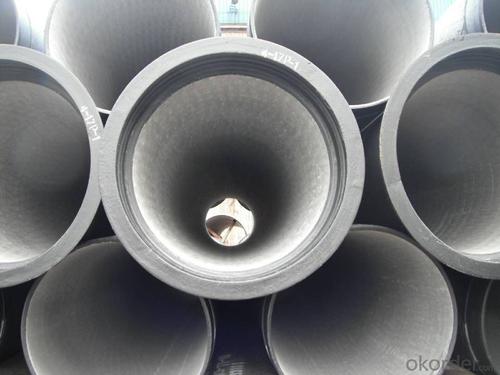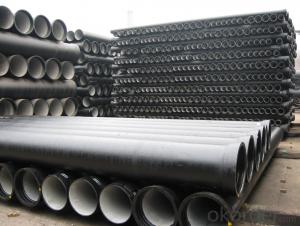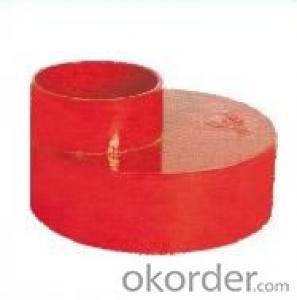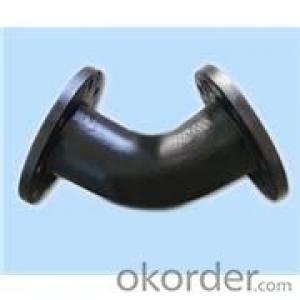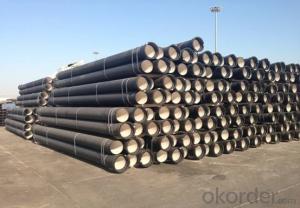DUCTILE IRON PIPE DN80-DN1600
- Loading Port:
- China Main Port
- Payment Terms:
- TT OR LC
- Min Order Qty:
- -
- Supply Capability:
- -
OKorder Service Pledge
OKorder Financial Service
You Might Also Like
Specification:
1) The standard of pipe: ISO2531:1998, K9
2) Effective length: 6m
3) Inner cement line: Portland cement line as per ISO4179
4) Zinc coating: at least 130g/m2 as per ISO8179
5) Bitumen painting: at least 70um as per ISO8179
6) With 100% quantity of NBR ring, or SBR ring, or EPDM ring as per ISO4633
7) DN80mm-800mm
8) High strength, lighter than grey iron, good corrosion resistance, no furring, small flow resistance, easy fixing, long life tome about 100 yeas
9) Produced by Hangzhou chunfeng machine
10) Checked by automatic inspection equipment
11) Composition:
Chemical composition | |||
Chemical composition | Ductile Cast Iron Pipe (%) | Grey iron pipe (%) | Steel pipe (%) |
C | 3.5-4.0 | 3.2-3.8 | 0.1-0.2 |
Si | 1.9-2.6 | 1.4-2.2 | 0.15-0.4 |
Mn | 0.15-0.45 | 0.4-0.6 | 0.3-0.6 |
P | ≤0.06 | ≤0.3 | 0.02-0.03 |
S | ≤0.02 | ≤0.1 | 0.02-0.03 |
Mg | 0.03-0.06 |
|
|
12) Feature:
Mechanical properties | |||
| Ductile Cast Iron Pipe | Grey Iron Pipe | Steel Pipe |
Tensile Strength(Mpa) | ≥420 | 150-260 | ≥400 |
Yield Strength(Mpa) | ≥300 | No Confirmation | No Confirmation |
Bending Strength(Mpa) | ≥590 | 200-360 | ≥400 |
Elongation (%) | ≥10 | Neglected | ≥18 |
Brinell Hardness(HBS) | ≤230 | ≤230 | About 140 |
13) T type mechanical joint
14) Packing: in bulk or container
- Q: What is the expected joint tightness for ductile iron pipes?
- The expected joint tightness for ductile iron pipes is typically high. Ductile iron pipes are known for their strong and durable nature, making them highly resistant to leaks and joint failures. The joints in ductile iron pipes are usually designed to provide a secure and tight connection, ensuring minimal water or fluid loss. Various joint types are commonly used for ductile iron pipes, including mechanical joints, restrained joints, and push-on joints. Each of these joint types is designed to provide a reliable seal and prevent any leakage. Mechanical joints use a mechanical gland and rubber gaskets to create a tight seal. These joints require a certain level of torque during assembly to ensure proper compression and sealing. Restrained joints, on the other hand, are specifically designed to withstand external forces, such as soil movement or pressure, and maintain their tightness. These joints typically use a mechanical restraint system, such as a key-locking mechanism, to prevent joint separation. Push-on joints are the easiest to install and provide a secure seal by utilizing a rubber gasket that is compressed when the pipes are pushed together. These joints are commonly used in smaller diameter pipes where the external forces are minimal. Overall, ductile iron pipes are expected to have a high level of joint tightness, ensuring reliable and leak-free performance in various applications, including water distribution, wastewater systems, and industrial piping networks.
- Q: Are ductile iron pipes resistant to chemical attacks?
- Generally, ductile iron pipes exhibit resistance to chemical attacks. The high corrosion resistance of ductile iron makes it suitable for a wide range of applications, including water and wastewater systems. To further enhance their resistance to chemical attacks, ductile iron pipes are commonly lined with a protective coating such as cement mortar or epoxy. This lining acts as a barrier between the pipe material and corrosive substances, preventing any degradation of the iron. However, it is important to consider that the level of resistance may vary depending on the specific chemical being transported, as well as the concentration and temperature of the solution. Therefore, it is advisable to seek the guidance of experts or engineers to ensure the appropriateness of ductile iron pipes for specific chemical environments.
- Q: How are ductile iron pipes repaired if they get damaged?
- There are several methods available for repairing ductile iron pipes, each dependent on the severity of the damage. Below are some commonly used techniques: 1. Spot Repair: When the damage is minimal and localized, a spot repair can be performed. This involves removing the damaged section of the pipe and replacing it with a new one. The new section is typically connected to the existing pipe using mechanical couplings or flanged connections. 2. Pipe Lining: If the damage is more extensive but the pipe remains structurally sound, pipe lining is a suitable option. This method entails inserting a liner into the damaged pipe, creating a new smooth surface. Various materials like epoxy or cured-in-place pipe (CIPP) can be used as liners. The advantage of this technique is that it eliminates the need for excavation and complete replacement of the pipe. 3. Pipe Bursting: In situations where the pipes are severely damaged or deteriorated, pipe bursting may be the most optimal solution. This process involves pulling a new pipe through the damaged one, simultaneously fracturing the old pipe and substituting it with a new one. Pipe bursting is typically employed when the existing pipe is irreparable and necessitates complete replacement. 4. Welding and Patching: In certain cases, small leaks or cracks in ductile iron pipes can be rectified through welding or patching. Welding involves melting and fusing the metal to seal the damaged area. Patching, on the other hand, involves applying a specialized epoxy or composite material over the affected section to create a watertight seal. It is essential to consider factors such as the extent of the damage, accessibility to the pipe, and the proficiency of the repair crew when selecting the appropriate repair method. Regardless of the technique chosen, a thorough assessment, meticulous planning, and skillful execution are necessary to ensure a successful and long-lasting repair.
- Q: Can ductile iron pipes be used in acidic environments?
- Yes, ductile iron pipes can be used in acidic environments. Ductile iron has excellent resistance to corrosion, including acidic conditions, due to its protective oxide layer. This makes it a suitable choice for applications in which exposure to acids is expected.
- Q: How are ductile iron pipes joined to fittings and valves?
- Ductile iron pipes are typically joined to fittings and valves through a process known as flanged connection or mechanical joint. Flanged connections involve the use of flanges, which are circular discs with evenly spaced holes around the perimeter. These flanges are bolted together, creating a tight seal between the pipe and the fitting or valve. To join a ductile iron pipe to a fitting or valve using a flanged connection, the pipe end is first prepared by cleaning and deburring any rough edges. A gasket made of rubber or other suitable material is then placed between the pipe end and the flange face. The flange is aligned with the pipe, and bolts are inserted through the holes in the flange, passing through corresponding holes in the fitting or valve. Once all the bolts are in place, they are tightened evenly, gradually applying pressure to compress the gasket and create a secure and leak-proof seal. To ensure proper alignment and sealing, tightening the bolts is typically done in a specific pattern or sequence. Alternatively, ductile iron pipes can also be joined to fittings and valves using mechanical joints. This involves the use of a rubber gasket or gland that is inserted into a groove on the pipe end. The fitting or valve also has a corresponding groove, and when the two are brought together, the gasket is compressed, creating a tight seal. Mechanical joints offer some flexibility, allowing for slight movement or expansion and contraction of the pipe. This can be beneficial in applications where there may be thermal variations or ground movement, reducing the risk of pipe failure. Both flanged connections and mechanical joints are widely used in various industries and applications that require the joining of ductile iron pipes to fittings and valves. The choice of joining method depends on factors such as the specific application, pipe size, pressure requirements, and local codes and regulations.
- Q: Are ductile iron pipes suitable for airport runway drainage?
- Ductile iron pipes are indeed a suitable choice for airport runway drainage. Their exceptional strength and durability enable them to endure heavy loads and extreme conditions commonly encountered in airport operations. Moreover, these pipes possess corrosion resistance, a vital characteristic for drainage systems exposed to diverse chemicals and environmental factors. Additionally, their smooth inner surfaces facilitate efficient water flow and prevent blockages that could disrupt the drainage system. Furthermore, ductile iron pipes are effortless to install and maintain, thus establishing themselves as a dependable option for airport runway drainage systems.
- Q: What are the different lining materials available for ductile iron pipe?
- There are several different lining materials available for ductile iron pipes. These linings are used to protect the pipe from corrosion and extend its lifespan. Some common lining materials include: 1. Cement Mortar Lining: This lining consists of a layer of cement mortar applied to the interior surface of the pipe. It provides a smooth and durable barrier against corrosion and is commonly used in water and wastewater applications. 2. Polyethylene Encasement: Polyethylene encasement involves wrapping the pipe with a layer of polyethylene film. This lining provides excellent corrosion protection and is often used in aggressive soil conditions. 3. Polyurethane Lining: Polyurethane lining is a spray-applied material that forms a seamless and flexible barrier inside the pipe. It offers superior resistance to chemicals and abrasion, making it suitable for applications involving aggressive fluids. 4. Epoxy Lining: Epoxy lining is a popular choice for lining ductile iron pipes, as it provides excellent resistance to corrosion and chemicals. It is typically applied as a liquid coating that cures to form a smooth and protective layer. 5. Zinc Coating: Zinc coating, also known as galvanizing, involves applying a layer of zinc to the exterior surface of the pipe. This lining provides corrosion resistance and is commonly used in outdoor and exposed applications. These lining materials offer different advantages and are chosen based on the specific needs of the application. Factors such as the type of fluid being transported, environmental conditions, and expected service life are considered when selecting the most suitable lining material for ductile iron pipes.
- Q: What is the expected hydraulic performance of ductile iron pipes?
- The expected hydraulic performance of ductile iron pipes is generally very high. Ductile iron pipes have a smooth inner surface that promotes efficient flow of fluids, resulting in low friction losses and high flow rates. They have excellent resistance to corrosion and abrasion, ensuring long-term performance in various water and wastewater applications. Ductile iron pipes also have a high tensile strength, allowing them to withstand high internal and external loads without deformation or failure. This makes them suitable for use in both above-ground and below-ground applications, including water distribution systems, sewage and wastewater transport, industrial piping, and irrigation systems. Furthermore, ductile iron pipes have the ability to adapt to ground movement and settle without breaking, thanks to their flexibility and resilience. This makes them a reliable choice in areas with unstable soil conditions or seismic activity. Overall, the expected hydraulic performance of ductile iron pipes is characterized by efficient flow, minimal pressure losses, durability, and the ability to withstand various external forces. These qualities make them a popular choice for water infrastructure projects, ensuring reliable and efficient transportation of fluids for a long service life.
- Q: Advantages and disadvantages of ductile iron pipes?
- Ductile iron pipes are mainly heated and annealed by intermediate frequency furnace, and then made as lining cement. The cast iron pipe is not made of lining cement.
- Q: What is the difference between cast iron pipe and seamless steel pipe and galvanized steel pipe?
- Galvanized steel pipe: divided into cold galvanized steel pipe, hot galvanized steel pipe, cold galvanized steel pipe has been banned, and the latter is also advocated by the state for the time being. In 60s and 70s, developed countries began to develop new types of pipes, and galvanized pipes were banned. China's Ministry of construction and other four ministries also issued a civilization, indeed from two, 000 years since the galvanized pipe as a water supply pipe, the New District cold water pipe has rarely used galvanized pipe, and some of the hot water pipe is galvanized pipe. Hot dip galvanized steel pipe is widely used in fire, power and highway.
Send your message to us
DUCTILE IRON PIPE DN80-DN1600
- Loading Port:
- China Main Port
- Payment Terms:
- TT OR LC
- Min Order Qty:
- -
- Supply Capability:
- -
OKorder Service Pledge
OKorder Financial Service
Similar products
Hot products
Hot Searches
Related keywords




